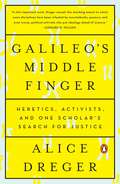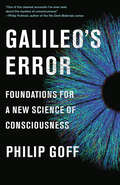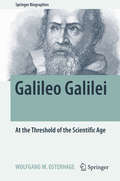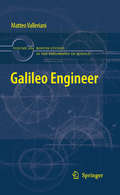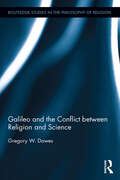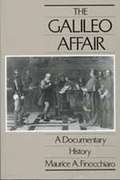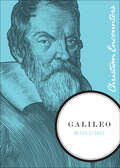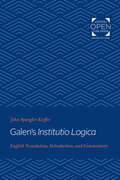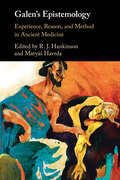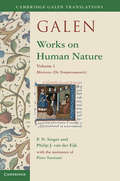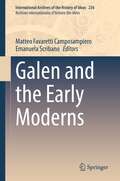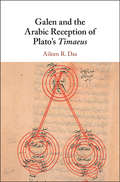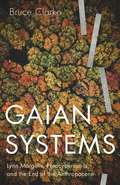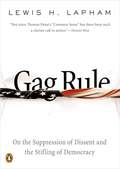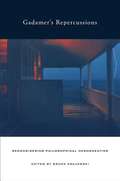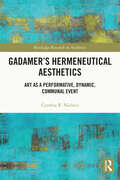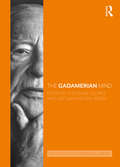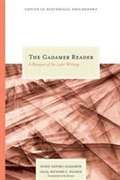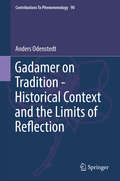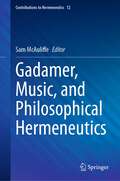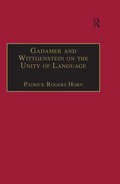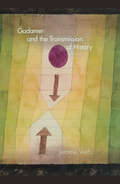- Table View
- List View
Galileo's Middle Finger
by Alice DregerJared Diamond, author of Guns, Germs, and Steel and The World until Yesterday"Alice Dreger would win a prize for this year's most gripping novel, except for one thing: her stories are true, and this isn't a novel. Instead, it's an exciting account of complicated good guys and bad guys, and the pursuit of justice."An impassioned defense of intellectual freedom and a clarion call to intellectual responsibility, Galileo's Middle Finger is one American's eye-opening story of life in the trenches of scientific controversy. For two decades, historian Alice Dreger has led a life of extraordinary engagement, combining activist service to victims of unethical medical research with defense of scientists whose work has outraged identity politics activists. With spirit and wit, Dreger offers in Galileo's Middle Finger an unforgettable vision of the importance of rigorous truth seeking in today's America, where both the free press and free scholarly inquiry struggle under dire economic and political threats.This illuminating chronicle begins with Dreger's own research into the treatment of people born intersex (once called hermaphrodites). Realization of the shocking surgical and ethical abuses conducted in the name of "normalizing" intersex children's gender identities moved Dreger to become an internationally recognized patient rights' activist. But even as the intersex rights movement succeeded, Dreger began to realize how some fellow progressive activists were employing lies and personal attacks to silence scientists whose data revealed uncomfortable truths about humans. In researching one such case, Dreger suddenly became the target of just these kinds of attacks.Troubled, she decided to try to understand more--to travel the country to ferret out the truth behind various controversies, to obtain a global view of the nature and costs of these battles. Galileo's Middle Finger describes Dreger's long and harrowing journeys between the two camps for which she felt equal empathy: social justice activists determined to win and researchers determined to put hard truths before comfort. Ultimately what emerges is a lesson about the intertwining of justice and of truth--and a lesson of the importance of responsible scholars and journalists to our fragile democracy.Booklist (starred review)"A crusader in the mold of muckrackers from a century ago, Dreger doesn't try to hide her politics or her agenda. Instead she advocates for change intelligently and passionately. Highly recommended."Kirkus (starred review): "Let us be grateful that there are writers like Dreger who have the wits and the guts to fight for truth." Dan Savage, founder of "It Gets Better" Project; author of American Savage: "If there ever there were a book that showed how democracy requires smart activism and solid data--and how that kind of work can be defeated by moneyed interests, conservative agendas, inept governments, and duplicitous "activists"--this is it. Galileo's Middle Finger reads like a thriller. The cliché applies: I literally couldn't put it down. Alice Dreger leaves you wondering what's going to happen to America if our universities continue to turn into corporate brands afraid of daring research and unpopular ideas about who we are."
Galileo's Middle Finger: Heretics, Activists, and the Search for Justice in Science
by Alice DregerNew York Times Book Review "[S]mart, delightful... a splendidly entertaining education in ethics, activism and science."Editors's Choice, New York Times Book ReviewAn impassioned defense of intellectual freedom and a clarion call to intellectual responsibility, Galileo's Middle Finger is one American's eye-opening story of life in the trenches of scientific controversy. For two decades, historian Alice Dreger has led a life of extraordinary engagement, combining activist service to victims of unethical medical research with defense of scientists whose work has outraged identity politics activists. With spirit and wit, Dreger offers in Galileo's Middle Finger an unforgettable vision of the importance of rigorous truth seeking in today's America, where both the free press and free scholarly inquiry struggle under dire economic and political threats.This illuminating chronicle begins with Dreger's own research into the treatment of people born intersex (once called hermaphrodites). Realization of the shocking surgical and ethical abuses conducted in the name of "normalizing" intersex children's gender identities moved Dreger to become an internationally recognized patient rights' activist. But even as the intersex rights movement succeeded, Dreger began to realize how some fellow progressive activists were employing lies and personal attacks to silence scientists whose data revealed uncomfortable truths about humans. In researching one such case, Dreger suddenly became the target of just these kinds of attacks.Troubled, she decided to try to understand more--to travel the country to ferret out the truth behind various controversies, to obtain a global view of the nature and costs of these battles. Galileo's Middle Finger describes Dreger's long and harrowing journeys between the two camps for which she felt equal empathy: social justice activists determined to win and researchers determined to put hard truths before comfort. Ultimately what emerges is a lesson about the intertwining of justice and of truth--and a lesson of the importance of responsible scholars and journalists to our fragile democracy.Booklist (starred review)"A crusader in the mold of muckrackers from a century ago, Dreger doesn't try to hide her politics or her agenda. Instead she advocates for change intelligently and passionately. Highly recommended."Kirkus (starred review): "Let us be grateful that there are writers like Dreger who have the wits and the guts to fight for truth." Jared Diamond, author of Guns, Germs, and Steel and The World until Yesterday"Alice Dreger would win a prize for this year's most gripping novel, except for one thing: her stories are true, and this isn't a novel. Instead, it's an exciting account of complicated good guys and bad guys, and the pursuit of justice."From the Hardcover edition.
Galileo's Error: Foundations for a New Science of Consciousness
by Philip GoffFrom a leading philosopher of the mind comes this lucid, provocative argument that offers a radically new picture of human consciousness—panpsychism.Understanding how brains produce consciousness is one of the great scientific challenges of our age. Some philosophers argue that consciousness is something "extra," beyond the physical workings of the brain. Others think that if we persist in our standard scientific methods, our questions about consciousness will eventually be answered. And some even suggest that the mystery is so deep, it will never be solved. Decades have been spent trying to explain consciousness from within our current scientific paradigm, but little progress has been made.Now, Philip Goff offers an exciting alternative that could pave the way forward. Rooted in an analysis of the philosophical underpinnings of modern science and based on the early twentieth-century work of Arthur Eddington and Bertrand Russell, Goff makes the case for panpsychism, a theory which posits that consciousness is not confined to biological entities but is a fundamental feature of all physical matter—from subatomic particles to the human brain. In Galileo's Error, he has provided the first step on a new path to the final theory of human consciousness.
Galileo Galilei: At the Threshold of the Scientific Age (Springer Biographies)
by Wolfgang W. OsterhageThis new scientific biography explores the influences on, and of, Galileo’s exceptional work, thereby revealing novel connections with the worldviews of his age and beyond.Galileo Galilei's contribution to science is unquestionable. And his conflict with the church establishment of his time is no less famous. In this book, authored by a physicist and history scholar, Galileo's life and work are described against a backdrop of the prior scientific state of the art in his various fields of achievement. Particular emphasis is placed on Galileo's vision of the world in relation to historic and also future cosmological models. The impact of his discoveries and theories for the later development of physics and astronomy is a further focus of the narrative.
Galileo Engineer
by Matteo VallerianiThis work systematically investigates and reconstructs the practical knowledge Galileo shared during his lifetime. Galileo shared many aspects of practical knowledge. These included the methods and experience of foremen and engineers active within various frameworks. Galileo did not always react to such scientific impulses in the same way. On the one hand, he not only shared practical knowledge, but also acted as an engineer, especially within the framework of the art of war at the end of the sixteenth century, and more so during the time he spent in Padua. On the other hand, his scientific achievements were largely based on and influenced by aspects of practical knowledge coming from particular disciplines and activities, without him ever becoming an expert in these disciplines. Two case studies, the first concerned with Galileo's theory of the strength of materials and the second with his achievement of an atomistic heat doctrine, enable a focus on the early modern model of generation of new scientific knowledge based on the conflicting interaction between aspects of practical knowledge and Aristotelian theoretical assumptions.
Galileo and the Conflict between Religion and Science (Routledge Studies in the Philosophy of Religion)
by Gregory W. DawesFor more than 30 years, historians have rejected what they call the ‘warfare thesis’ – the idea that there is an inevitable conflict between religion and science – insisting that scientists and believers can live in harmony. This book disagrees. Taking as its starting point the most famous of all such conflicts, the Galileo affair, it argues that religious and scientific communities exhibit very different attitudes to knowledge. Scripturally based religions not only claim a source of knowledge distinct from human reason. They are also bound by tradition, insist upon the certainty of their beliefs, and are resistant to radical criticism in ways in which the sciences are not. If traditionally minded believers perceive a clash between what their faith tells them and the findings of modern science, they may well do what the Church authorities did in Galileo’s time. They may attempt to close down the science, insisting that the authority of God’s word trumps that of any ‘merely human’ knowledge. Those of us who value science must take care to ensure this does not happen.
The Galileo Affair: A Documentary History
by Maurice A. FinocchiaroThis book provides a documentary history of the series of developments which began in 1613 and culminated in 1633 with the trial and condemnation of Galileo.
Galileo (Christian Encounters)
by Mitch StokesWe learn about life through the lives of others. Their experiences, their trials, their adventures become our schools, our chapels, our playgrounds. Christian Encounters, a series of biographies from Thomas Nelson Publishers, highlights important lives from all ages and areas of the Church through prose as accessible and concise as it is personal and engaging. Some are familiar faces. Others are unexpected guests. Whether the person is Galileo, William F. Buckley, John Bunyan, or Isaac Newton, we are now living in the world that they created and understand both it and ourselves better in the light of their lives. Their relationships, struggles, prayers, and desires uniquely illuminate our shared experience.HERO OR HERETIC? GENIUS OR BLASPHEMER?It's no mystery how profound a role Galileo played in the Scientific Revolution. Less explored is the Italian innovator's sincere, guiding faith in God. In this exhaustively researched biography that reads like a page-turning novel, Mitch Stokes draws on his expertise in philosophy, logic, math, and science to attune modern ears with Galileo's controversial genius.Emerging from the same Florentine milieu that produced Dante, da Vinci, Machiavelli, Michelangelo, Amerigo Vespuci, Galileo questioned with a persistence that spurred his world toward an unabating era of discovery. Stokes confronts the myth that Galileo's stance on heliocentricity stood astride a church vs. science divide and explores his calculations for the dimensions of Dante's hell, his understanding of motion, and his invention of the pendulum clock.To read this volume is to journey through Galileo's remarkable life: from his inquisitive childhood to his dying days, when, although blind and decrepit, he soldiered on, dictating mathematical thoughts and mentoring young proteges.
Galen's Institutio Logica: English Translation, Introduction, and Commentary
by John Spangler KiefferOriginally published in 1964. This book is a translation of Institutio Logica, which was probably written by Galen, although scholars disagree on the possibility of this work being a forgery. It provides a survey on the history of logic written around the third century.
Galen's Epistemology: Experience, Reason, and Method in Ancient Medicine
by R. J. Hankinson Matyáš HavrdaDetermining what has gone wrong in a malfunctioning body and proposing an effective treatment requires expertise. Since antiquity, philosophers and doctors have wondered what sort of knowledge this expertise involves, and whether and how it can warrant its conclusions. Few people were as qualified to deal with these questions as Galen of Pergamum (129–ca. 216). A practising doctor with a keen interest in logic and natural science, he devoted much of his enormous literary output to the task of putting medicine on firm methodological grounds. At the same time he reflected on philosophical issues entailed by this project, such as the nature of experience, its relation to reason, the criteria of truth, and the methods of justification. This volume explores Galen's contributions to (mainly scientific) epistemology, as they arise in the specific inquiries and polemics of his works, as well as their legacy in the Islamic world.
Galen: Volume 1, Mixtures (Cambridge Galen Translations)
by Dr P. N. Singer Professor Philip J. van der Eijk Professor Piero TassinariMixtures is of central importance for Galen's views on the human body. It presents his influential typology of the human organism according to nine mixtures (or 'temperaments') of hot, cold, dry and wet. It also develops Galen's ideal of the 'well-tempered' person, whose perfect balance ensures excellent performance both physically and psychologically. Mixtures teaches the aspiring doctor how to assess the patient's mixture by training one's sense of touch and by a sophisticated use of diagnostic indicators. It presents a therapeutic regime based on the interaction between foods, drinks, drugs and the body's mixture. Mixtures is a work of natural philosophy as well as medicine. It acknowledges Aristotle's profound influence whilst engaging with Hippocratic ideas on health and nutrition, and with Stoic, Pneumatist and Peripatetic physics. It appears here in a new translation, with generous annotation, introduction and glossaries elucidating the argument and setting the work in its intellectual context.
Galen and the World of Knowledge
by Christopher Gill Tim Whitmarsh John WilkinsGalen is the most important medical writer in Graeco-Roman antiquity, and also extremely valuable for understanding Graeco-Roman thought and society in the second century AD. This volume of new essays locates him firmly in the intellectual life of his period, and thus aims to make better sense of the medical and philosophical 'world of knowledge' that he tries to create. How did Galen present himself as a reader and an author in comparison with other intellectuals of his day? Above all, how did he fashion himself as a medical practitioner, and how does that self-fashioning relate to the performance culture of second-century Rome? Did he see medicine as taking over some of the traditional roles of philosophy? These and other questions are freshly addressed by leading international experts on Galen and the intellectual life of the period, in a stimulating collection that combines learning with accessibility.
Galen and the Early Moderns (International Archives of the History of Ideas Archives internationales d'histoire des idées #236)
by Matteo Favaretti Camposampiero Emanuela ScribanoThis book explores the presence of Galen of Pergamon (129 – c. 216 AD) in early modern philosophy, science, and medicine. After a short revival due to the humanistic rediscovery of his works, the influence of the great ancient physician on Western thought seemed to decline rapidly as new discoveries made his anatomy, physiology, and therapeutics more and more obsolete. In fact, even though Galenism was gradually dismissed as a system, several of his ideas spread through the modern world and left their mark on natural philosophy, rational theology, teleology, physiology, biology, botany, and the philosophy of medicine. Without Galen, none of these modern disciplines would have been the same. Linking Renaissance with the Enlightenment, the eleven chapters of this book offer a unique and detailed survey of both scientific and philosophical Galenisms from the sixteenth to the late eighteenth century. Figures discussed include Julius Caesar Scaliger, Giambattista Da Monte, Hyeronimus Fabricius ab Aquapendente, Andrea Cesalpino, Thomas Browne, Kenelm Digby, Henry More, Ralph Cudworth, Robert Boyle, John Locke, Guillaume Lamy, Jean-Baptiste Verduc, Gottfried Wilhelm Leibniz, Christian Wolff, Julien Offray de La Mettrie, Denis Diderot, and Kurt Sprengel.
Galen and the Arabic Reception of Plato's Timaeus
by Aileen R. DasThis first full-length study of the Arabic reception of Plato's Timaeus considers the role of Galen of Pergamum (129–c. 216 CE) in shaping medieval perceptions of the text as transgressing disciplinary norms. It argues that Galen appealed to the entangled cosmological scheme of the dialogue, where different relations connect the body, soul, and cosmos, to expand the boundaries of medicine in his pursuit for epistemic authority – the right to define and explain natural reality. Aileen Das situates Galen's work on disciplinary boundaries in the context of medicine's ancient rivalry with philosophy, whose professionals were long seen as superior knowers of the cosmos vis-à-vis doctors. Her case studies show how Galen and four of the most important Christian, Muslim, and Jewish thinkers in the Arabic Middle Ages creatively interpreted key doctrines from the Timaeus to reimagine medicine and philosophy as well as their own intellectual identities.
Gaian Systems: Lynn Margulis, Neocybernetics, and the End of the Anthropocene (Posthumanities #60)
by Bruce ClarkeA groundbreaking look at Gaia theory&’s intersections with neocybernetic systems theory Often seen as an outlier in science, Gaia has run a long and varied course since its formulation in the 1970s by atmospheric chemist James Lovelock and microbiologist Lynn Margulis. Gaian Systems is a pioneering exploration of the dynamic and complex evolution of Gaia&’s many variants, with special attention to Margulis&’s foundational role in these developments.Bruce Clarke assesses the different dialects of systems theory brought to bear on Gaia discourse. Focusing in particular on Margulis&’s work—including multiple pieces of her unpublished Gaia correspondence—he shows how her research and that of Lovelock was concurrent and conceptually parallel with the new discourse of self-referential systems that emerged within neocybernetic systems theory. The recent Gaia writings of Donna Haraway, Isabelle Stengers, and Bruno Latour contest its cybernetic status. Clarke engages Latour on the issue of Gaia&’s systems description and extends his own systems-theoretical synthesis under what he terms &“metabiotic Gaia.&” This study illuminates current issues in neighboring theoretical conversations—from biopolitics and the immunitary paradigm to NASA astrobiology and the Anthropocene. Along the way, he points to science fiction as a vehicle of Gaian thought. Delving into many issues not previously treated in accounts of Gaia, Gaian Systems describes the history of a theory that has the potential to help us survive an environmental crisis of our own making.
Gag Rule: On the Suppression of Dissent and the Stifling of Democracy
by Lewis LaphamLapham issues a call to action in defense of one of our most important liberties--the right to raise our voices against the powers that be and have those voices heard.
Gadamer's Repercussions: Reconsidering Philosophical Hermeneutics
by Bruce KrajewskiThis volume brings together many prominent scholars to assess, re-evaluate, and question Hans-Georg Gadamer's works, as well as his place in intellectual history. The book includes a recent essay by Gadamer on "the task of hermeneutics."
Gadamer’s Hermeneutical Aesthetics: Art as a Performative, Dynamic, Communal Event (Routledge Research in Aesthetics)
by Cynthia R. NielsenThis book offers a sustained scholarly analysis of Gadamer’s reflections on art and our experience of art. It examines fundamental themes in Gadamer’s hermeneutical aesthetics such as play, festival, symbol, contemporaneity, enactment, art’s performative ontology, and hermeneutical identity. The first two chapters focus on Gadamer’s critical appropriation and movement beyond Kantian and Hegelian aesthetics (and includes a coda on Heidegger’s influence). The final three chapters argue for the continued relevance of Gadamer’s hermeneutical aesthetics by bringing his claims into conversation with contemporary art and music, as well as the ethical and sociopolitical dimensions of the Artworld and art-praxis. The ethical and sociopolitical aspects of art- and music-making are given particular attention in chapters devoted to 20th century African American artist Romare Bearden, Banksy’s street art, and a range of jazz expressions, from traditional jazz to the complex practice of free jazz. Gadamer’s Hermeneutical Aesthetics will appeal to researchers and advanced students working on Gadamer, philosophical hermeneutics, continental philosophy, aesthetics, and the philosophy of contemporary art and music.
The Gadamerian Mind (Routledge Philosophical Minds)
by Theodore GeorgeHans-Georg Gadamer (1900–2002) is one of the most important philosophers of the post-1945 era. His name has become all but synonymous with the philosophical study of hermeneutics, the field concerned with theories of understanding and interpretation and laid out in his landmark book Truth and Method. Influential not only within continental philosophy, Gadamer’s thought has also made significant contributions to related fields such as religion, literary theory, and education. The Gadamerian Mind is a major survey of the fundamental aspects of Gadamer’s thought, with contributions from leading scholars of Gadamer and hermeneutics from around the world. 38 chapters are divided into six clear parts: Overviews Key concepts Historical influences Contemporary encounters Beyond philosophy Legacies and questions. Although Gadamer’s work addresses a remarkable range of topics, careful consideration is given throughout the volume to consistent concerns that orient his thought. Important in this respect is his relation to philosophers in the Western tradition, from Plato to Heidegger. An indispensable resource for anyone studying and researching Gadamer, hermeneutics, and the history of twentieth-century philosophy, The Gadamerian Mind will also be of interest to those in related disciplines such as religion, literature, political theory, and education.
The Gadamer Reader: A Bouquet Of The Later Writings
by Richard E. Palmer Hans-Georg GadamerThe German volume Gadamer Lesebuch [A Gadamer Reader] (1997), selected and edited by Jean Grondin in consultation with Hans-Georg Gadamer himself, contains a set of essays that present a cross section of writings by one of the twentieth century's greatest philosophers. The volume begins with an autobiographical sketch and culminates in a conversation with Jean Grondin that looks back over a lifetime of productive philosophical work. The essays not already available in English have here been translated by Richard E. Palmer, a respected translator of Gadamer's writings. The sixteen essays contained in the Lesebuch are augmented here by three other essays: Gadamer's last essay on Derrida, "Hermeneutics Tracking the Trace" (1994) and two essays on practical philosophy. The Gadamer Reader: A Bouquet of the Later Writings richly conveys the scope and depth of Gadamer's thought, covering the range of his work in hermeneutics, aesthetics, practical philosophy, and essays on Plato, Hegel, and Heidegger. In addition, Palmer offers introductory remarks before each essay that explain its importance in the context of Gadamer's writings and define its key terms. Throughout, in both his translation and commentary, his aim is to make this critically important philosopher as clear and accessible as possible to an English-speaking audience.
Gadamer on Tradition - Historical Context and the Limits of Reflection
by Anders OdenstedtThis book discusses Gadamer's theory of context-dependence. Analytical and partly critical, the book also shows exegetical accuracy in the rendering of Gadamer's position. It explores the following questions that Gadamer's theory of context-dependence tries to answer: in what way is thought influenced by and thus dependent on its historical context? To what extent and in what way is the individual able to become reflectively aware of and emancipate himself from this dependence? The book takes Gadamer's wide interests into account, e. g. issues relating to the history of historiography and the nature of art and aesthetic experience. The problem of the context-dependence of thought is prominent in contemporary philosophy, including the fields of structuralism, post structuralism, deconstruction, certain forms of feminist philosophy and the philosophy of science. In this sense, the book discusses an issue with wide repercussions.
Gadamer, Music, and Philosophical Hermeneutics (Contributions to Hermeneutics #12)
by Sam McAuliffeThis volume explores Hans-Georg Gadamer's philosophical hermeneutics within a musical context. It features contributions from philosophers, musicians, educators, and musicologists from a variety of backgrounds, and sheds light on both the hermeneutic nature of music and the musicality of hermeneutics. Contributors to this volume hermeneutically think with music to uncover its fundamentally hermeneutic character, and by thinking with Gadamer in a musical context, explore ways in which hermeneutics may be understood to possess an inherent musicality. Gadamer's thought is taken up in a variety of musical contexts including improvisation, musical performance, classical music, jazz, and music criticism.This first volume to explore Gadamer's hermeneutics in a musical context breaks new ground by challenging musical concepts and by pushing Gadamer's thought in new directions. It appeals to philosophers engaged with Gadamer's thought (and philosophical hermeneutics more broadly), as well as philosophers of music, musicologists, and musicians interested in critically engaging with the practice of performing and listening to music.
Gadamer and Wittgenstein on the Unity of Language: Reality and Discourse without Metaphysics (Ashgate Wittgensteinian Studies)
by Patrick Rogers HornIn this innovative comparison of Gadamer and Wittgenstein, the author explores their common concern with the relation of language to reality. Patrick Horn's starting point is the widely accepted view that both philosophers rejected a certain metaphysical account of that relation in which reality determines the nature of language. Horn proceeds to argue that Gadamer never completely escaped metaphysical assumptions in his search for the unity of language. In this respect, argues Horn, Gadamer's work is nearer to the earlier rather than to the later Wittgenstein. The final chapter of the book highlights the work of Wittgenstein’s pupil Rush Rhees, who shows that Wittgenstein's own later emphasis on language games, while doing justice to the variety of language, does less than justice to the dialogical relation between speakers of a language, wherein the unity of language resides. Contrasting Rhees's account of the unity of language with those given by Gadamer and the early Wittgenstein brings out the importance of understanding reality in terms of the life that people share rather than in terms of what philosophers say about reality.
Gadamer and the Transmission of History (Studies In Continental Thought Ser.)
by Jerome VeithObserving that humans often deal with the past in problematic ways, Jerome Veith looks to philosopher Hans-Georg Gadamer and his hermeneutics to clarify these conceptions of history and to present ways to come to terms with them. Veith fully engages Truth and Method as well as Gadamer's entire work and relationships with other German philosophers, especially Kant, Hegel, and Heidegger in this endeavor. Veith considers questions about language, ethics, cosmopolitanism, patriotism, self-identity, and the status of the humanities in the academy in this very readable application of Gadamer's philosophical practice.
Gadamer and the Legacy of German Idealism
by Kristin GjesdalThe philosophy of Hans-Georg Gadamer interests a wide audience that spans the traditional distinction between European (continental) and Anglo-American (analytic) philosophy. Yet one of the most important and complex aspects of his work - his engagement with German Idealism - has received comparatively little attention. In this book, Kristin Gjesdal uses a close analysis and critical investigation of Gadamer's Truth and Method (1960) to show that his engagement with Kant, Hegel, and Schleiermacher is integral to his conception of hermeneutics. She argues that a failure to engage with this aspect of Gadamer's philosophy leads to a misunderstanding of the most pressing problem of post-Heideggerian hermeneutics: the tension between the commitment to the self-criticism of reason, on the one hand, and the turn towards the meaning-constituting authority of tradition, on the other. Her study provides an illuminating assessment of both the merits and the limitations of Gadamer's thought.
